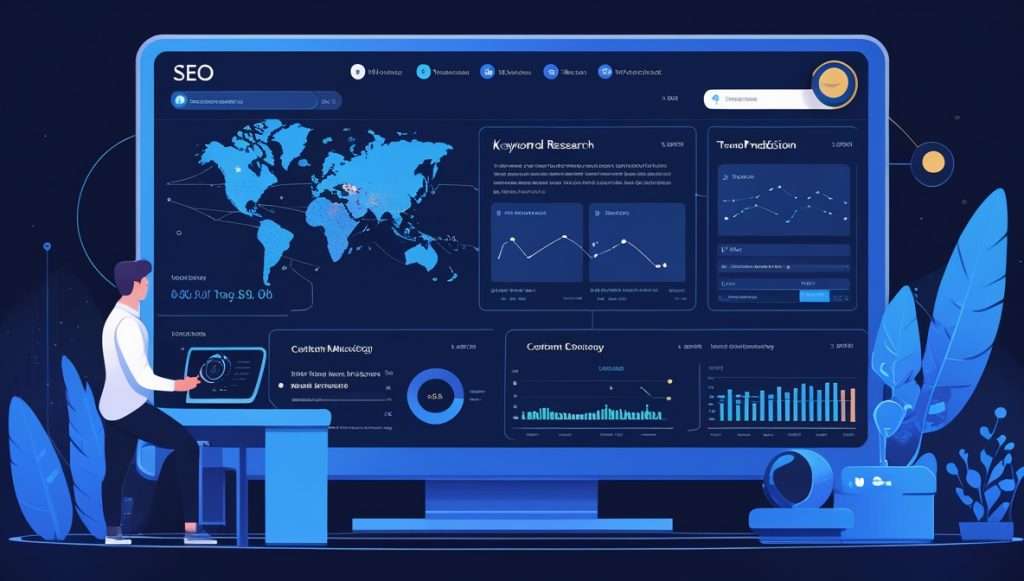The Future of SEO is rapidly evolving as AI-generated content transforms the way search engines rank web pages. Artificial intelligence continues to advance in an upward trajectory which enables automated content creation while generating more precise results for user intent. AI will assume a substantial part in forming SEO techniques by 2025 thus affecting content quality and search rankings and search engine mechanics.
How AI-Generated Content is Changing SEO Practices

AI-generated content is revolutionizing SEO by automating keyword optimization, enhancing content structuring, and improving search intent alignment. Tools like ChatGPT and Jasper help businesses produce content quickly, but search engines now emphasize quality over quantity. AI-powered platforms analyze user behavior, suggest high-ranking topics, and refine content based on search trends. However, search engines prioritize expertise, authority, and trustworthiness (E-A-T), meaning businesses must balance AI efficiency with human oversight to ensure originality and value.
Content Optimization and Keyword Strategy
AI-driven content tools optimize articles by placing and repeating essential keywords to help content reach better search engine rankings. AI tools use extensive dataset analysis to determine top-performing keywords so content creators can plan these strategic elements into their written content. Businesses which use AI for keyword research enable creation of content rich in SEO elements that fulfills user needs and promotes better search rankings. AI platforms utilize the ability to generate keyword alternative searches combined with search engine algorithm-adherent long-tail keywords. Relevant content creation through this method leads to higher search ranking probability.
Personalized and Adaptive Content
AI technology allows users to build content that automatically changes to match individual user interests and actions in addition to their search targets. AI examines user behavior to optimize content delivery for specific demographic segments which leads both users and search engines to show more interest. Search engines value user experience above all else so AI-powered content customization maintains value by making content relevant for readers. AI technology uses user preferences to create content of various formats including blogs videos and infographics. Search Engine Optimization benefits through adaptability because better user retention rates and increased dwell time result.
Automated Content Creation and Quality Enhancement
The application of artificial intelligence produces content of higher quality because it reduces mistakes and enhances readability as well as verifying factual information. AI-based tools examine syntax distribution together with textual structure as well as linguistic register to build content that meets all aspects of SEO excellence standards. The automated content creation process shortens the work period needed for hand corrections and proofreading tasks which lets companies create better-quality ranked content at speed. The detection system integrated into AI software enables it to find duplicated content while offering optimization proposals which help preserve uniqueness to meet search engine requirements.
AI’s Impact on Search Engine Algorithms and Ranking Factors

AI-driven search algorithms now focus on content quality, user intent, and engagement rather than just keywords. Google’s updates, like BERT and Helpful Content, analyze relevance, readability, and semantic meaning, making AI-generated content more scrutinized. Ranking factors now include user engagement metrics such as dwell time and bounce rates. Additionally, AI-powered NLP interprets conversational queries better, requiring SEO strategies to prioritize natural, meaningful content. The shift towards multimedia-rich content further challenges AI-only approaches, making human involvement essential for maintaining rankings.
Semantic Search and Natural Language Processing (NLP)
AI improves semantic search effectiveness because it recognizes user objectives and contexts and relevant search terms in ways that determine content rankings. The search engines use NLP algorithms to process search engine queries through natural conversational methods. AI-generated content which incorporates NLP principles increases its search engine ranking because it supplies straightforward solutions that address user search requests efficiently. AI technologies now present vital role in boosting voice search optimization for SEO success. Organizations that prepare content for voice search queries line up ahead of the competition for better search engine placement.
AI-Based Rank Tracking and Performance Analysis
AI-powered SEO tools examine ranking elements to reveal performance-enhancing recommendations for enhancing content visibility. API-powered tracking platforms monitor immediate keyword positions and user-use and backlink metrics at all times. The information reveals essential SEO development prospects which enable businesses to evaluate their content alignment and possible performance enhancements. RSS feeds and algorithms serve as constant sources of rank-tracking information which also delivers ongoing suggestions for performance improvements. Taking steps in advance benefits a website for long-lasting SEO results.
Algorithm Adaptability and Search Engine Updates
The modifications engines make to their algorithms occur frequently and AI assists businesses in responding to these modifications successfully. Firms using AI-based SEO tools detect algorithm changes to receive recommendations that uphold ranking standards. The site’s discovery through search engines remains steady because its adaptable algorithms prevent unexpected ranking plunges. The capabilities of AI include both trend detection along with future algorithm modification prediction so businesses can maintain their competitive edge.
The Role of AI in the Future of SEO Strategies

AI is transforming SEO by automating keyword research, content optimization, and technical audits while predicting search trends through data analysis. Future strategies will integrate AI for efficiency but rely on human creativity for authenticity and engagement. As search engines prioritize originality and authority, businesses must adopt a hybrid approach—leveraging AI for insights while ensuring content remains valuable and user-focused. Those who strike this balance will gain a competitive edge in search rankings and long-term digital success.
AI-Driven Content Marketing
AI makes it possible to perform data-driven content marketing as it analyzes market trends while maximizing distribution of content material. AI tools enable content marketers to examine audience behaviors so they create content which appeals directly to their target consumers. With AI-driven content marketing companies produce captivating material which stimulates both user sharing and natural website visits. The AI recommendation system generates various versions of content targeted at different audience segments thus boosting viewer reach while increasing their engagement.
Predictive SEO and AI-Based Insights
Through performing massive data evaluation AI systems demonstrate the ability to forecast upcoming SEO trends which helps enterprises maintain their position regarding industry developments. The implementation of Artificial intelligence brings predictive SEO functions which enable users to forecast keyword patterns and user search and content consumption preferences. The use of AI-driven insights enables businesses to develop ahead-of-time SEO strategies that fulfill anticipated search engine standards. Businesses obtain a competitive advantage through AI competitor analysis which delivers important industry trend data to help them improve their approach.
Enhancing User Experience Through AI
Users benefit from AI because it serves customized materials which are both valuable and pertinent while boosting patient retention. AI optimizes website navigation as well as load times by studying user behavior patterns with accompanied feedback to enhance site performance. Better search engine rankings rely on user-friendly websites because such enhancements positively impact search engine optimization. Virtual assistants powered by artificial intelligence help improve user engagement through automatic response generation which leads to better customer satisfaction levels.
Conclusion
The Future of SEO is being shaped by AI-generated content, which enhances content quality, ranking factors, and search engine adaptability. Organizations that embrace AI-enhanced SEO methods will gain a profit through their better competitive position in the digital marketplace. The advancement of AI will enable content optimization for search rankings to become both more efficient and offer personalized results while producing stronger impacts.

